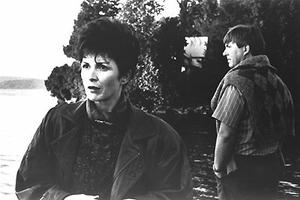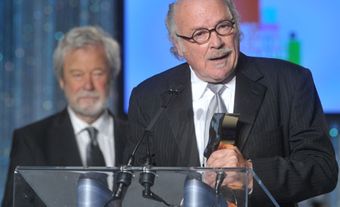Synopsis
Le déclin de l'empire américain depicts four history professors, a wife and two graduate students associated with the Université de Montréal gathered for a night and morning at a countryside house beside Lake Memphremagog in Québec's Eastern Townships. In the introductory scenes the men cook dinner while the women work out at a gym, with both groups discussing sexual politics and their personal escapades. Then they all gather to eat and talk. After-dinner revelations of adultery briefly disrupt the party but, by the next morning, the group appear rather as they were at the beginning.
Analysis
Although written, directed and widely received as a very funny erotic comedy, Le déclin is also a film with a thesis. Arcand signals his intention with a declarative prelude: a senior historian, Dominique (Dominique Michel), is interviewed for Radio-Canada and explains that when a preoccupation with personal happiness pervades a civilization, it is a symptom of its decline, whether it is Rome, the Ancien Régime of 18th-century France, or now "the American Empire." What follows is a comic depiction of such preoccupations among these elite academics.
A sharp social satire, Le déclin has been seen as a reflection on the social and political aftermath of the failure of the 1980 Québec referendum and of René Lévesque's leadership of the Parti Québécois (Arcand previously made a documentary on the subject, Le Confort et l'indifférence, in 1981). As Karen Fricker pointed out in the Guardian, “the film was also read as a commentary on the failure of Québec nationalists of Arcand's generation to see a mature, responsible nation into being.”
Critical and Audience Reception
Le déclin was the most popular Québécois film in English Canada since Mon oncle Antoine (1971) and one of the most popular Québécois films ever in France, where it sold over one million tickets. It received the Golden Reel Award as the highest-grossing Canadian film of the year and went on to make more than $25 million internationally. It was also a modest box office hit in the United States at a time when French-language films in American cinemas were extremely rare.
A great critical success, it was widely regarded as a French Canadian version of Lawrence Kasdan’s The Big Chill (1983), and also drew comparisons to Louis Malle’s similarly conversational My Dinner with Andre (1982). Roger Ebert called Le déclin “wise, deep, and painful,” while Variety called it a “deviously sardonic comedy of carnal manners.” Rita Kempley of the Washington Post said the film was “certainly the year's most intellectual work, a frequently funny, unrepressed meditation on midnight in North America.” Vincent Canby of the New York Times called the film’s dialogue “spontaneously funny, rueful and full of oblique revelations.”
Arcand was later hired to develop a Hollywood remake, which was never realized. He followed Le déclin with the equally if not more successful Jésus de Montréal (Jesus of Montréal) in 1989.
Honours and Legacy
Le déclin received the international critics’ prize at the Cannes Film Festival, eight Genie Awards and an Academy Award nomination for best foreign-language film — the first film from Québec to receive that honour. It won both the Audience Award and the Best Canadian Feature Film Award at TIFF, and was named the best film of the year by the Association québécoise des critiques de cinéma (AQCC). It was named one of the Top 10 Canadian films of all time in polls conducted by TIFF in 1993 and 2004, and the 10th-best Canadian film of all time in a Playback readers’ poll in 2002. In 2016, it was named one of 150 essential works in Canadian cinema history in a poll of 200 media professionals conducted by TIFF, Library and Archives Canada, the Cinémathèque québécoise and The Cinematheque in Vancouver in anticipation of the Canada 150 celebrations in 2017.
Le déclin would prove to be the first film in a trilogy described by Arcand as “a reflection on morals and life in our times,” which continued with the wildly successful Academy Award-winning sequel Les Invasions barbares in 2003, and concluded with L’Âge des ténèbres (Days of Darkness) in 2007. In 2006, Arcand adapted his screenplay into an award-winning stage production in Paris.
See also: Canadian Feature Films; The Cinema of Québec.
Awards
1987 Genie Awards
Performance by an Actor in a Supporting Role (Gabriel Arcand)
Performance by an Actress in a Supporting Role (Louise Portal)
Best Achievement in Film Editing (Monique Fortier)
Best Overall Sound (Adrian Croll, Jean-Pierre Joutel, Richard Besse)
Best Sound Editing (Paul Dion, Andy Malcolm, Diane Boucher)
Best Original Screenplay (Denys Arcand)
Achievement in Direction (Denys Arcand)
Best Motion Picture (Réne Malo, Roger Frappier)
Golden Reel Award (Réne Malo, Roger Frappier)
Others
FIPRESCI Prize, Cannes Film Festival (1986)
Best Canadian Feature Film, Toronto International Film Festival (1986)
People’s Choice Award, Toronto International Film Festival (1986)
Prix L.-E.-Ouimet-Molson, l'Association québécoise des critiques de cinéma (AQCC) (1986)
Best Foreign Language Film, New York Film Critics Circle Awards (1986)

 Share on Facebook
Share on Facebook Share on X
Share on X Share by Email
Share by Email Share on Google Classroom
Share on Google Classroom




